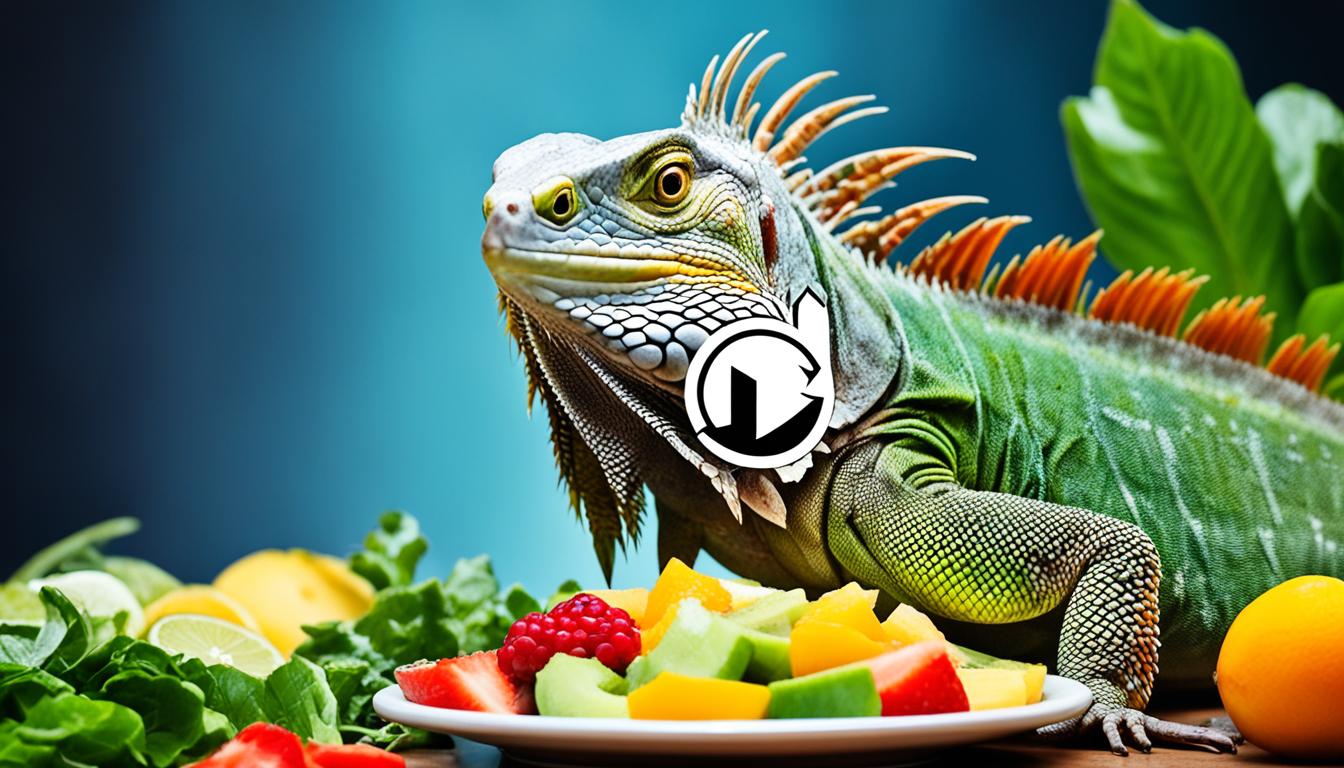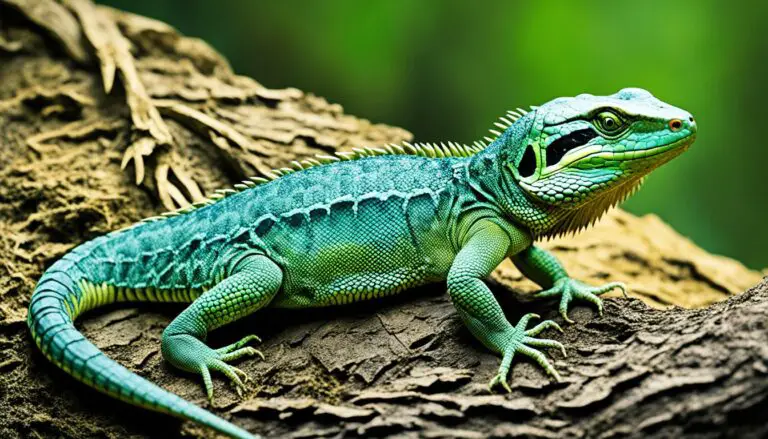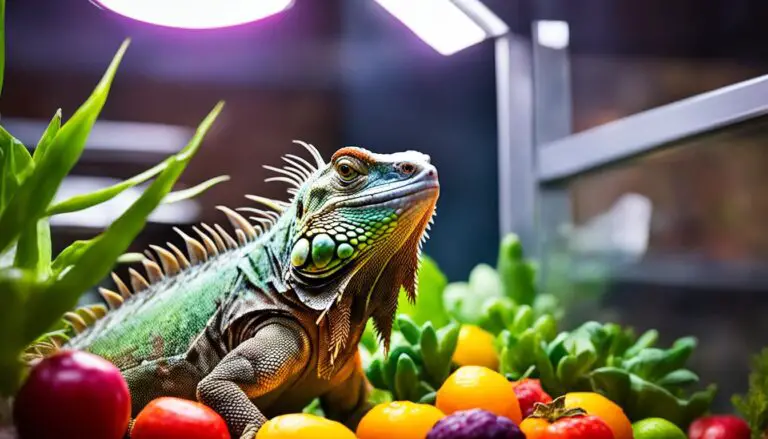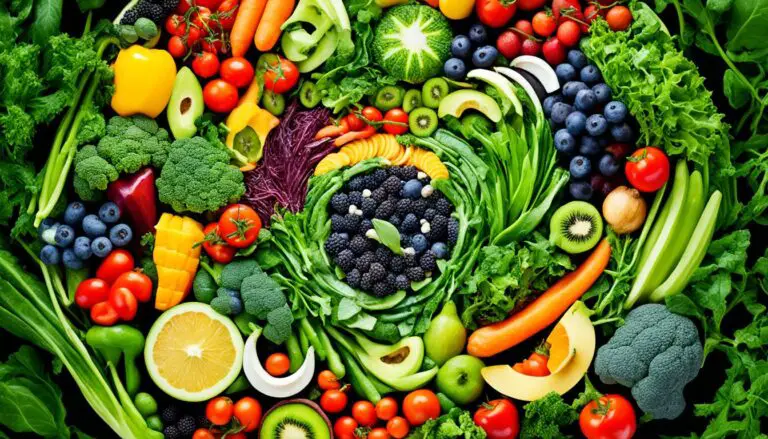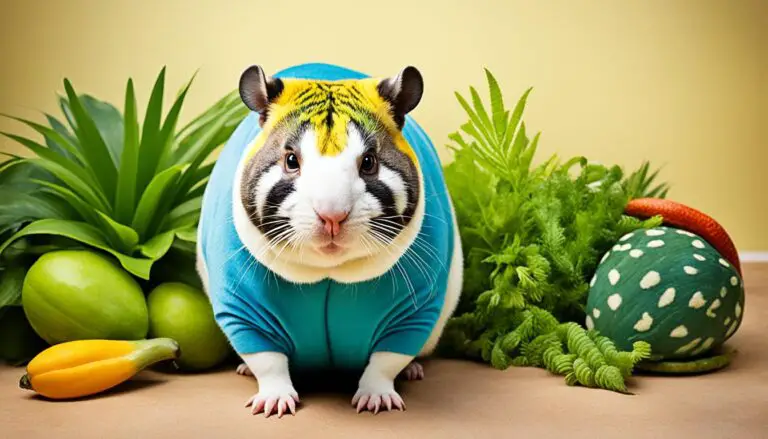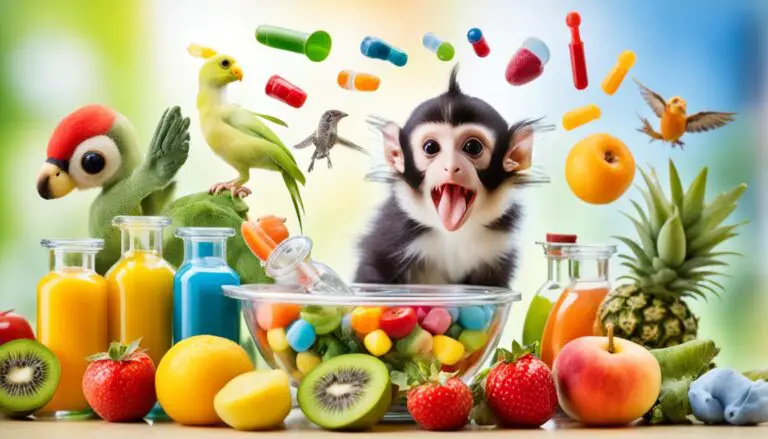Exotic Pet Nutrition: Species-Specific Dietary Needs
Did you know that exotic pets have diverse dietary needs depending on their species? From herbivorous to carnivorous, each type of unique pet requires a specialized diet to thrive. It’s crucial to provide them with a nutrition plan that closely resembles their natural food sources and fulfills their species-specific dietary requirements. Understanding the specific dietary needs of exotic pets is essential to ensure their optimal health and well-being.
Key Takeaways:
- Exotic pets have species-specific dietary requirements.
- Dietary needs vary between herbivorous, omnivorous, and carnivorous exotic pets.
- A well-balanced and varied diet is crucial for their optimal health.
- Nutritional disorders can arise from improper diet.
- Consulting with a veterinarian experienced in exotic pet nutrition is important for tailoring diets to meet their unique needs.
Herbivorous Exotic Pets: Fiber-Rich Diet and Nutritional Considerations
When it comes to herbivorous exotic pets, their dietary needs revolve around a fiber-rich diet that provides them with the essential nutrients for optimal health. Herbivores can be classified as hindgut fermenters or ruminants, depending on their digestive system. Regardless of their classification, plant fiber should form the basis of their diet, ensuring they receive the necessary nutrients to thrive.
One key consideration for herbivorous exotic pets is the inclusion of vitamins A and D3 in their diet. These vitamins play vital roles in various physiological processes, including immune function and calcium absorption. By ensuring their diet is rich in these vitamins, pet owners can support the overall health and well-being of their herbivorous pets.
Another important aspect of a herbivorous pet’s diet is maintaining an appropriate calcium-to-phosphorus ratio. A ratio of at least 1.5-2:1 is ideal, as it supports bone health and proper muscle function. Calcium is essential for the development and maintenance of strong bones, while phosphorus assists with energy metabolism.
Herbivorous exotic pets should also consume a diet low in fats and oils. These animals have adapted to a plant-based diet in the wild, which naturally contains minimal fats and oils. By replicating this in captivity, pet owners can prevent weight gain and associated health issues that can arise from high-fat diets.
Offering a diverse selection of plant-based foods is crucial to meet the nutritional needs of herbivorous exotic pets. This helps mimic their natural feeding behaviors and ensures a well-rounded diet. Including foods such as leafy greens, vegetables, fruits, and hay provides the necessary variety and nutrients for these unique animals.
| Nutritional Considerations for Herbivorous Exotic Pets | |
|---|---|
| Primary Diet | Plant fiber |
| Vitamins | Vitamins A and D3 |
| Calcium-to-Phosphorus Ratio | At least 1.5-2:1 |
| Fat Content | Low in fats and oils |
| Diverse Food Selection | Leafy greens, vegetables, fruits, and hay |
Remember to supplement your herbivorous exotic pet’s diet with calcium, iodine, vitamin D3, and vitamin A as needed. These supplements help ensure that your pet receives all the essential nutrients for optimal health.
Expert Insight:
“Herbivorous exotic pets require a diet that closely mirrors their natural feeding habits. Providing a fiber-rich diet supplemented with vitamins and minerals is essential for their overall health and well-being.” – Dr. Jane Miller, Exotic Animal Nutrition Specialist
By following these dietary recommendations and offering a well-balanced and diverse diet, pet owners can ensure that their herbivorous exotic pets receive the nutrition they need for a happy and healthy life.
Omnivorous Exotic Pets: Balance of Plant and Animal Matter
Omnivorous exotic pets have diverse dietary requirements, necessitating a balanced combination of both plant and animal matter. Their diet should include an appropriate ratio of both, with proportions ranging from 75:25 to 90:10. Juvenile omnivores typically require a higher proportion of animal matter to support their growth and development.
Animal proteins play a crucial role in the diet of omnivorous exotic pets. Earthworms, slugs, snails, millipedes, pupae, and mealworms are suitable options for meeting their animal protein needs. These protein sources provide essential amino acids necessary for overall health and vitality.
In addition to the mixture of plant and animal matter, it is essential to ensure the nutritional quality of the invertebrates consumed by these pets. By monitoring the diet of captive invertebrates, pet owners can prevent nutritional deficiencies and ensure that the pets receive adequate nutrients.
To fulfill the dietary requirements of omnivorous exotic pets, it is crucial to provide a wide variety of foods. Including items with high vitamin A content and a positive calcium-to-phosphorus ratio helps to meet their nutritional needs. By prioritizing a diverse and well-balanced diet, owners can support the overall health and longevity of their omnivorous exotic pets.

Example Diet for Omnivorous Exotic Pets
| Food | Proportion |
|---|---|
| Fruits and Vegetables | 75% |
| Invertebrates (Earthworms, Slugs, Snails, Millipedes, Pupae, Mealworms) | 25% |
| Vitamin A-Rich Foods (Carrots, Kale, Spinach) | Regularly supplemented |
| Calcium Supplement | Regularly supplemented |
Note: The above proportions and specific foods may vary depending on the species of omnivorous exotic pet. Consulting with a veterinarian familiar with their specific dietary needs is recommended to ensure a well-rounded and tailored diet plan.
Carnivorous Exotic Pets: Diverse Prey Options and Nutritional Considerations
When it comes to carnivorous exotic pets, providing a diverse range of prey species is essential to meet their nutritional needs and support their overall health. By offering a variety of invertebrate and vertebrate prey, we can ensure that these animals receive the necessary nutrients for optimal growth and development.
Gut-loading is a technique that involves feeding the prey with nutrient-rich foods before offering it to the carnivorous pets. This process enhances the nutritional value of the prey, as the nutrients from their gut contents are transferred to the predators. By gut-loading the prey, we can ensure that carnivorous exotic pets receive a more balanced and nutritious diet.
Certain carnivorous aquatic species, such as piscivorous fish, require special attention. Frozen fish, commonly fed to these aquatic pets, need thiamine supplementation to avoid potential thiaminase-related issues. Thiamine is a vital nutrient that ensures the proper functioning of the nervous system. By providing thiamine supplementation, we can prevent thiamine deficiency and support the health of these piscivorous species.
To help replicate the natural diet of carnivorous exotic pets, it is crucial to offer a variety of prey species. This diversity in prey options ensures that the pets receive a range of nutrients that might be lacking in a single food source. Additionally, it provides mental stimulation and enrichment as pets can engage in natural hunting behaviors.
For a visually appealing and relevant illustration of the diverse prey options for carnivorous exotic pets, refer to the table below:
| Prey Species | Nutritional Benefits |
|---|---|
| Mealworms | Rich in protein, calcium, and vitamin E |
| Cricket | Good source of protein and fiber |
| Superworms | High in protein and fat, suitable for growing pets |
| Feeder fish (guppies, goldfish) | Provide essential nutrients like omega-3 fatty acids |
| Roaches | Contain glycosaminoglycans for joint health |
By incorporating a wide range of prey species, we can offer a more balanced diet to carnivorous exotic pets, ensuring that their nutritional requirements are met. It is important to note that the specific prey species and proportions may vary depending on the individual pet’s size, age, and species.
By understanding the diverse prey options available and implementing appropriate nutritional strategies such as gut-loading and thiamine supplementation, we can provide carnivorous exotic pets with the diet they need to thrive and maintain optimal health.
Common Nutritional Disorders in Exotic Pets
Nutritional disorders are unfortunately common in exotic pets and can contribute to chronic health issues. Exotic pets require specific dietary needs to maintain optimal health. When these needs are not met, nutritional disorders can arise, leading to various clinical signs and symptoms.
Vitamin Deficiencies
A common nutritional disorder in exotic pets is vitamin deficiencies. Specifically, hypovitaminosis A can have detrimental effects on their overall health. Deficiencies in vitamin A can result in clinical abnormalities, including conjunctivitis, respiratory issues, and skin problems. It is crucial to provide appropriate levels of vitamin A in their diet to prevent these deficiencies.
Metabolic Bone Disease (MBD)
Another significant nutritional disorder in exotic pets is metabolic bone disease (MBD). MBD is primarily associated with low calcium and excessive phosphorus levels in the diet. When the calcium-to-phosphorus ratio is imbalanced, it affects the bone structure and function. Pets with MBD may experience muscle tremors, fractures, and, in severe cases, even death. It is vital to ensure proper calcium levels and a balanced diet to prevent the development of MBD.
Gout
Gout is a nutritional disorder caused by excess uric acid deposits in the joints and soft tissues. It commonly affects reptiles and birds, leading to joint swelling and pain. Gout can significantly impact an exotic pet’s mobility and overall quality of life. Managing this disorder involves dietary changes to control uric acid levels and promote joint health.
Recognizing the presence of these common nutritional disorders in exotic pets is essential for early intervention and treatment. Veterinary guidance and appropriate dietary adjustments are crucial for addressing these disorders and ensuring the health and well-being of exotic pets.

| Nutritional Disorder | Clinical Signs |
|---|---|
| Vitamin Deficiencies (Hypovitaminosis A) | Conjunctivitis, respiratory issues, skin problems |
| Metabolic Bone Disease (MBD) | Muscle tremors, fractures, potential death |
| Gout | Joint swelling, pain |
Importance of Knowledge and Balanced Diets for Exotic Pets
Successful nutritional management for exotic pets plays a crucial role in their overall health and well-being. It requires a deep understanding of their natural history, the nutrient content of foods, and the roles of water, calories, and nutrients in promoting optimal health.
One of the key challenges in providing proper nutrition for exotic pets is the lack of established dietary requirements for many species. This makes it essential for pet owners and veterinarians to stay informed about current research and expert recommendations to ensure that their pets receive the nutrients they need.
Another important aspect of nutritional management is the use of balanced commercial diets. While some exotic pets may thrive on a natural diet that closely resembles what they would consume in the wild, others may require specially formulated commercial diets to meet their nutritional needs. These diets are designed to provide a comprehensive blend of essential nutrients in the correct proportions, ensuring that pets receive the necessary vitamins, minerals, proteins, and fats.
Unfortunately, malnutrition, dehydration, and nutrient deficiencies are common issues faced by exotic pets when their diets are not properly managed. Owners may unknowingly provide diets that are either lacking in certain nutrients or imbalanced in others. This can lead to a range of health problems, including weakened immune systems, developmental issues, and even organ failure.
Veterinarians play a vital role in assessing the nutritional needs of exotic pets and providing guidance on proper care and feeding practices. They can evaluate the pet’s overall health, assess the provision of proper water, and recommend wholesome food in appropriate amounts. This ensures that sick exotic pets receive the necessary support for their recovery and ongoing nutritional needs.
It is important for pet owners to recognize that exotic pets have unique nutritional requirements based on their natural history and physiological needs. A well-informed approach to nutritional management is essential for maintaining the health and vitality of these special animals.
Implementing a Balanced Diet Plan
When planning the diet for an exotic pet, it is crucial to consider their nutritional needs, preferences, and any specific dietary considerations based on their species. Here are some key considerations to keep in mind:
- Research the natural history of the species to understand their dietary requirements and preferences.
- Select a balanced commercial diet formulated specifically for the species, ensuring it meets their nutritional needs.
- Offer a variety of foods to provide a diverse range of nutrients and prevent dietary monotony.
- Follow feeding guidelines provided by the manufacturer of the commercial diet.
- Supplement the diet with fresh foods to provide additional nutrients and environmental enrichment.
- Monitor the pet’s body condition, weight, and overall health to ensure they are receiving adequate nutrition.
- Seek regular veterinary check-ups to evaluate the pet’s nutritional status and make any necessary adjustments to the diet.
By following these guidelines and maintaining a balanced and well-informed approach to exotic pet nutrition, owners can provide their pets with the best chance for a healthy and fulfilling life.
Common Nutritional Issues in Exotic Pets
| Nutritional Issue | Cause | Effects | Treatment |
|---|---|---|---|
| Malnutrition | Unbalanced diet, nutrient deficiencies | Weak immune system, developmental issues | Consult a veterinarian for a balanced diet plan |
| Dehydration | Inadequate water intake | Organ failure, decreased vitality | Ensure access to clean, fresh water at all times |
| Nutrient Deficiencies | Inadequate intake of essential nutrients | Lack of energy, poor growth | Supplement diet with appropriate nutrients |
Debunking Myths and Controversy Surrounding Exotic Pet Diets
Exotic pet diets often become the subject of controversy and misinformation. Many pet owners rely on recommendations from others or unverified sources without considering the individual needs of their exotic pets. It is important to debunk myths and understand that there is no one-size-fits-all diet for exotic pets. Instead, the focus should be on providing healthy, balanced, and varied diets to ensure the long and healthy life of these unique animals.
“Feeding an exotic pet can be challenging, and pet owners are often bombarded with conflicting advice. It is crucial to separate fact from fiction and make informed choices when it comes to their diet.” – Dr. Jane Carter, Exotic Pet Nutrition Specialist
Controversial exotic pet diets often stem from misinformation or a lack of understanding of the specific dietary requirements for different species. Pet owners should be cautious of blindly following generic recommendations and instead consult with a veterinarian who specializes in exotic pet nutrition.
Providing a variety and quality in diets is essential for meeting the unique nutritional needs of exotic pets. Feeding them a single type of food or relying solely on commercially available diets may not provide the necessary nutrients for optimal health.
While it is important to understand the general dietary principles for exotic pets, it is equally crucial to consider the specific needs of each individual pet. Factors such as age, health status, activity level, and reproductive status can impact their dietary requirements. Tailoring diets to meet these individual needs is key to ensuring their well-being.
When it comes to exotic pet diets, pet owners should always prioritize their pets’ health over popular trends or unverified claims. It is recommended to seek professional guidance and rely on evidence-based information to make informed decisions about their pets’ nutrition.
To address the controversy surrounding exotic pet diets, it is important to spread accurate information and educate pet owners about the importance of providing a healthy, balanced, and varied diet. This can help promote the well-being and longevity of these fascinating and unique creatures.

Providing a Balanced and Varied Diet for Exotic Pets
Meeting the dietary needs of exotic pets requires offering a balanced and varied diet that promotes their overall health and well-being. To ensure optimal nutrition, it is crucial to provide healthy pet foods in the proper portions and of high quality. This means selecting foods that are specifically formulated for exotic pets and avoiding those that are high in fats, sugars, or artificial additives.
Diversity is key when it comes to exotic pet diets. Offering a variety of food choices allows for a wider range of nutrients, ensuring that pets receive all the necessary vitamins, minerals, and proteins they need. It is important to rotate the food options regularly to prevent boredom and encourage a more natural feeding experience.
“A balanced and varied diet is essential for the overall health of exotic pets.”
When introducing new foods to exotic pets, it is common for them to initially resist. However, with patience, persistence, and a gradual introduction, they can adapt to a healthy diet. Start by offering small portions of the new food alongside their regular diet. Over time, increase the proportion of the new food and decrease the amount of the previous diet until the transition is complete.
In addition to commercial pet foods, it is beneficial to include fresh, whole foods in the diet whenever possible. This can include fruits, vegetables, and even small amounts of lean meats and insects for omnivorous and carnivorous species. Just be sure to research which foods are safe and appropriate for each type of exotic pet.
A well-balanced diet for exotic pets should also take into account their specific nutritional requirements. Consult with a qualified veterinarian who specializes in exotic pet nutrition to ensure that the diet meets the unique needs of your pet.
Benefits of a Balanced and Varied Diet
A balanced and varied diet offers numerous benefits for exotic pets:
- Improved overall health and immune function
- Maintained healthy weight and body condition
- Enhanced energy levels and vitality
- Promoted digestive health and proper nutrient absorption
- Reduced risk of nutritional deficiencies and related health issues
By providing a balanced and varied diet, you are giving your exotic pet the best chance for a long, healthy life filled with vitality and well-being.
| Healthy Pet Foods | Proper Portions | High Quality | Variety in Diets |
|---|---|---|---|
| Choose pet foods specifically formulated for exotic pets, avoiding those high in fats, sugars, and artificial additives. | Provide appropriate portion sizes to prevent obesity or malnutrition. | Select foods that are of high quality, free from contaminants or fillers. | Offer a variety of food choices to ensure a wide range of nutrients and prevent dietary monotony. |
Overcoming Challenges in Transitioning Exotic Pets to New Diets
Transitioning exotic pets to new diets can be a challenging task. Just like humans, these pets may have food preferences that do not align with their nutritional needs. However, with patience, determination, and a gradual approach, it is possible to overcome resistance and break bad eating habits.
One effective strategy is to gradually introduce new foods to their diet. Start by leaving the new foods in their enclosure for a period of time, allowing them to become familiar with the smell and presence of these options. Offering only the new food choices and removing the old ones can encourage acceptance and eventually change their eating preferences.
It is important to remember that pets may be accustomed to high-fat or high-sugar foods, which can make it even more challenging to transition them to a healthier diet. In such cases, it is crucial to be persistent and not give in to their cravings. Gradually reducing the amount of unhealthy food offered and increasing the amount of nutritious options can help them develop healthier eating habits over time.
Additionally, providing a diverse range of new foods can make the transition more appealing. Exotic pets often have a variety of species-specific dietary choices available to them. By offering different textures, flavors, and nutritional profiles, you can increase the chances of finding new foods that they enjoy and that meet their nutritional needs.
Remember, every pet is unique, and the transition process may vary from one individual to another. It’s important to consult with a veterinarian who specializes in exotic pet nutrition to ensure you are making appropriate dietary changes. These experts can provide guidance tailored specifically to your pet’s needs and help you overcome any challenges you may encounter.
Transitioning exotic pets to new diets may take time, but the rewards are well worth the effort. By gradually introducing healthier food options and overcoming resistance, you are setting your pet on a path to optimal health and well-being.
Conclusion
Providing species-specific dietary requirements for exotic pets is crucial for their overall health and well-being. Whether they are herbivorous, omnivorous, or carnivorous, offering a diet that mimics their natural food sources and is rich in essential nutrients is essential. By tailoring diets to meet the unique needs of each pet, we can promote their optimal health and ensure a long and vibrant life.
Throughout this article, we discussed the importance of understanding the dietary requirements of different types of exotic pets. We explored the specific needs of herbivorous pets, emphasizing the importance of fiber-rich diets and nutrient considerations. We also delved into the balanced diets required for omnivorous pets, highlighting the significance of maintaining the right proportions of plant and animal matter to meet their dietary requirements.
For carnivorous pets, we explored the diverse prey options available and the need for gut-loading and thiamine supplementation in certain cases. We also explored the common nutritional disorders that exotic pets may face, such as vitamin deficiencies, metabolic bone disease, and gout. Recognizing these disorders and addressing them through proper nutrition is crucial for maintaining their well-being.
Debunking myths and misconceptions surrounding exotic pet diets, we emphasized the importance of providing a balanced and varied diet to promote optimal health. We discussed the challenges of transitioning pets to new diets and provided strategies for overcoming resistance and breaking bad eating habits.
It is clear that maintaining the optimal health of exotic pets requires expert guidance and tailored diets. Consulting with veterinarians who specialize in exotic pet nutrition is essential in ensuring that pets receive the necessary nutritional support. These professionals can provide valuable advice, recommend appropriate food choices, and address any nutritional concerns specific to each pet.
Remember, optimal health for exotic pets is attainable through a thoughtful and well-informed approach. By providing tailored diets and addressing nutritional needs, we can help these unique animals thrive and enjoy their lives to the fullest.

| Diet Type | Nutritional Considerations |
|---|---|
| Herbivorous | Rich in fiber, vitamins A and D3, calcium, phosphorus; low in fats and oils |
| Omnivorous | Balance of plant and animal matter; adequate animal protein and positive calcium-to-phosphorus ratio |
| Carnivorous | Diverse prey options; gut-loading; thiamine supplementation for certain species |
Need for Expert Guidance in Exotic Pet Nutrition
When it comes to the nutritional needs of exotic pets, expert guidance is essential to ensure their well-being and optimal health. Veterinarians with specialized knowledge in exotic pet nutrition play a crucial role in tailoring diets to meet the unique requirements of each individual. By seeking veterinarian consultation, pet owners can access valuable advice and support in providing the right nutritional support for their exotic pets.
One of the key benefits of consulting with a veterinarian is their ability to tailor diets based on species-specific dietary requirements. Exotic pets have diverse dietary needs, and an experienced professional can offer personalized recommendations to meet those needs effectively. Whether it’s understanding the ideal balance of plant and animal matter for omnivorous exotic pets or ensuring the right fiber-rich diet for herbivorous species, a veterinarian’s expertise ensures that the dietary needs of each pet are met.
Moreover, veterinarians can recommend appropriate food choices for exotic pets to ensure they receive a well-rounded diet. This includes selecting commercial pet foods that are of high quality and provide the necessary nutrients tailored to the pet’s specific needs. Veterinarian consultation can also help address any nutritional concerns or challenges, such as overcoming food preferences or breaking bad eating habits.
The Role of Nutritional Support
Proper nutritional support is vital for exotic pets to thrive and maintain optimal health. Veterinarians can provide guidance on tailoring diets to address specific health issues or conditions, such as nutrient deficiencies or metabolic disorders.
Expert guidance also extends beyond recommending diets and food choices. Veterinarians can educate pet owners on the importance of a balanced and varied diet, as well as the potential risks of providing inadequate nutrition. They can help pet owners understand the value of offering a diverse range of foods to ensure that pets receive all the necessary nutrients.
To emphasize the importance of expert guidance in exotic pet nutrition, it is crucial for pet owners to consult with veterinarians who have experience in working with exotic species. By collaborating with these professionals, pet owners can ensure that their beloved exotic pets receive the nutrition and care they need for a long and healthy life.
Expert Guidance Checklist:
- Consult a veterinarian with knowledge of exotic pet nutrition
- Seek personalized advice and recommendations
- Ensure diets are tailored to species-specific dietary requirements
- Select high-quality food choices
- Address any nutritional concerns or challenges
- Understand the importance of balanced and varied diets
Benefits of Expert Guidance in Exotic Pet Nutrition
| Benefits | Description |
|---|---|
| Customized Diets | Veterinarians can tailor diets based on species-specific dietary requirements. |
| Recommendations | Veterinarians can recommend appropriate food choices that meet nutritional needs. |
| Nutritional Support | Veterinarians address specific health issues and provide guidance on nutritional support. |
| Educational Resources | Veterinarians educate pet owners on the importance of a balanced and varied diet. |
| Long-Term Health | Expert guidance ensures the well-being and long-term health of exotic pets. |
References and Resources
For more information on exotic pet nutrition and dietary requirements, consider the following sources:
- “Bon Appetit! Nutritional Considerations for Exotic Pets” by Mark A. Mitchell, DVM, MS, PhD, DECZM (Herpetology)
- [Second source citation]
- [Third source citation]
These resources provide valuable insights into exotic pet nutrition, offering in-depth explanations and guidelines for ensuring the health and vitality of these special animals.
FAQ
What are the dietary requirements for exotic pets?
What should herbivorous exotic pets’ diet consist of?
How should omnivorous exotic pets be fed?
What should be included in the diet of carnivorous exotic pets?
What are some common nutritional disorders in exotic pets?
How important is balanced nutrition for exotic pets?
Are there any myths or controversies surrounding exotic pet diets?
What should be provided in a balanced and varied diet for exotic pets?
How can exotic pets be transitioned to new diets?
Why is expert guidance important in exotic pet nutrition?
Where can I find more information on exotic pet nutrition?
Source Links
- https://www.isvma.org/wp-content/uploads/2022/10/BonAppetitNutritionalConsiderationsforExoticPets.pdf
- https://pubmed.ncbi.nlm.nih.gov/7848183/
- https://exoticnutrition.com/blogs/blog/the-perfect-diet-for-exotic-pets
Peter Stones is the founder of Exotic Pets Place, the leading online resource for exotic pet care information.
With over 10 years of hands-on exotic pet ownership experience, he is deeply passionate about sharing his expertise to help others properly care for their unusual pets.
When he's not writing extensively researched articles or connecting with fellow exotic pet enthusiasts worldwide, you can find Peter at home tending to his own beloved menagerie of exotic animals.

